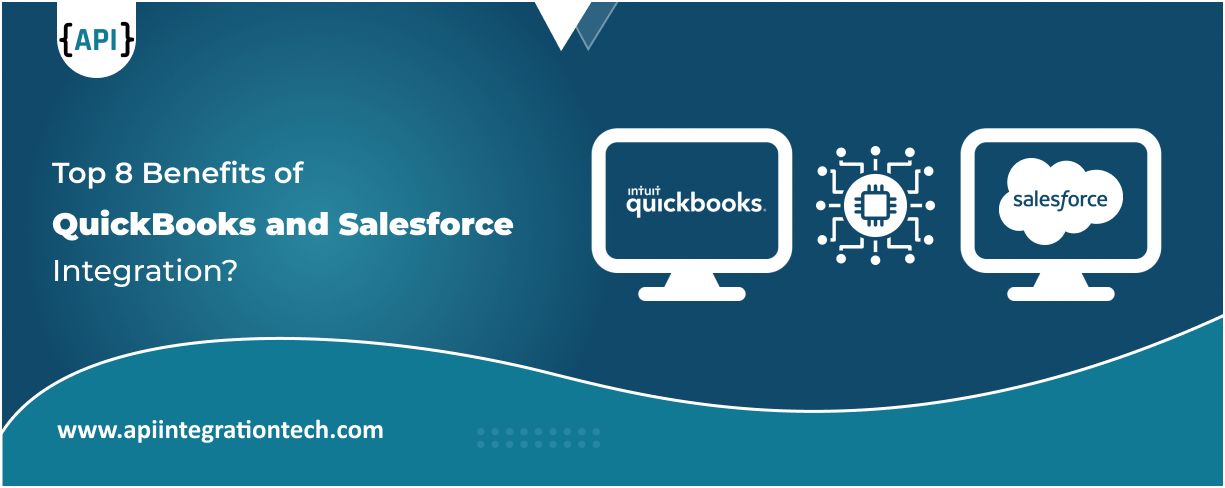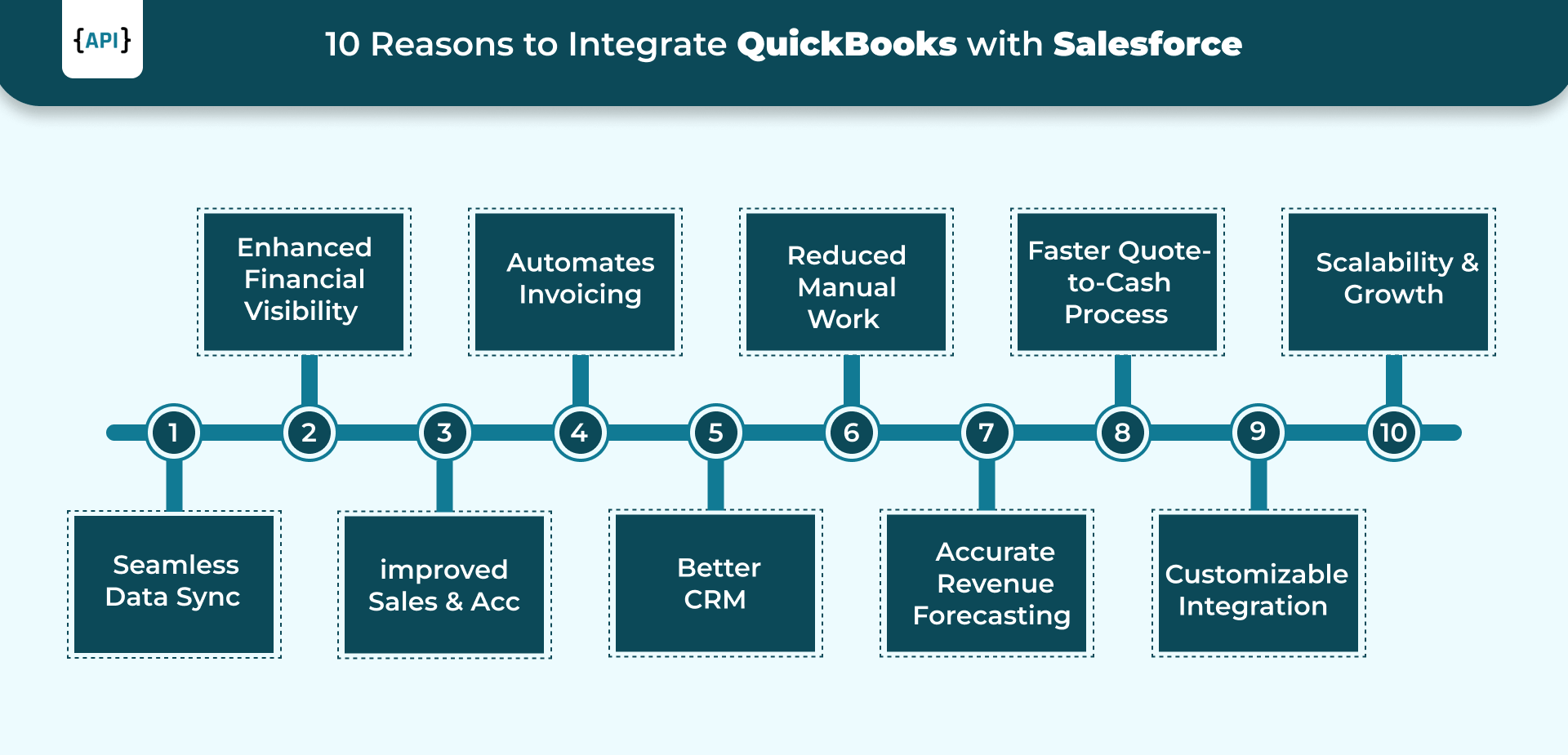Your business can really take off when financial tasks and customer relations are handled seamlessly. That’s why platforms like QuickBooks and Salesforce are so crucial.
Many companies who use isolated systems look for an all-in-one software to manage operations seamlessly. Accounting software like QuickBooks can be a game-changer for your business, helping you with automation and other incredible opportunities.
According to an ACCA report,more than 50% of C-level executives predicted that advanced automated accounting systems would change the industry. And Salesforce, the leader in the CRM market with a 22% global share as per Statista focuses on improving customer relationships.
But what if these two powerful platforms worked together? In this blog, you can explore the powerful benefits of Salesforce and QuickBook integration.
What is QuickBooks?
QuickBooks is a top-rated accounting software that simplifies financial activity by automating procedures like invoicing, payroll, expense monitoring, tax planning, and financial reporting.
It can be accessed in two versions i.e., cloud-based and desktop versions for businesses to manage their finances anywhere and a user-friendly interface.
Upgrade your financial processes with our Fintech API integration services
QuickBooks Key Features:
- Real-time tracking of income and expenses.
- Automated invoicing and payment notification.
- Integration with third-party apps for smooth business operations.
What is Salesforce?
Salesforce is designed to manage interactions with current and potential customers, Salesforce allows systematic processes of sales insights, marketing trends, customer service, and analytics. The platform provides a cloud-based system, making it available on any device with internet connectivity.
Salesforce Key Features:
- Sales tracking and forecasting.
- Marketing automation to boost customer engagement.
- A highly customizable interface to fit unique business needs.
Top 8 Benefits of QuickBooks and Salesforce Integration:
Given below are some of the best benefits of Salesforce and QuickBooks integration:
1. Customization of dashboards, and workflows
One of the most important benefits of modern tools is that they adapt to unique business needs. Quickbooks Salesforce Integration stands out in customization, allowing businesses to customize workflows, dashboards, and reports. For example, you can set specific rules for invoices or create personalized customer follow-ups to boost engagement.
2. Protecting customer’s data effectively
In the age of cyber threats protecting sensitive business data is an important task. Salesforce and QuickBooks are prepared with excellent security features, such as encryption, multi-factor authentication, and role-based access controls. These measures ensure that your financial and customer data remain safe while obeying global data protection regulations like GDPR and CCPA.
3. Save time with workflow automation
Time is money, and automation tools like these help businesses save both. QuickBooks upgrade tasks like invoicing, expense tracking, and tax calculations, while Salesforce simplifies customer interactions and follow-ups. This automation allows your team to focus on strategic goals instead of monotonous processes and time-consuming tasks.
4. Track Records and deals with complete transparency
Tracking every transaction and customer interaction is important for transparency and informed decision-making. QuickBooks API Integration services provide complete financial records, while Salesforce logs all client interaction notifications like emails and deals.
Streamline accounting processes with Xero API Integration Services
5. Categorized transactions with predefined rules
Organizing financial transactions is crucial for accurate reporting and decision-making. QuickBooks simplifies this by categorizing transactions automatically or based on predefined rules. For example, repeated expenses like utilities or payroll can be grouped for easier tracking, ensuring clarity during tax season or audits.
6. Shared access keeps everyone on the same page
When teams work individually productivity suffers. Salesforce enables smooth collaboration by centralizing customer data, while QuickBooks allows accountants and managers to access financial data simultaneously. Shared access promotes better coordination and keeps everyone on the same page, no matter where they work.
7. Budget-friendly and powerful features
Cost efficiency is a priority for businesses, and these platforms deliver excellent value. QuickBooks provides tiered pricing plans, allowing small businesses to access important accounting tools without breaking the bank. Similarly, Salesforce provides scalable options customized to businesses of all sizes, making powerful CRM tools accessible to growing enterprises.
8. Billing Process with zero disputes
QuickBooks automates the billing process, sending timely invoices and notifications to customers. Salesforce complements this by managing customer communications, ensuring a smooth billing experience. They remove delays and minimize payment disputes, keeping your finances healthy.
Conclusion
Salesforce and QuickBooks Online Integration automates workflows and boosts financial visibility to deliver a smooth customer experience, this integration drives efficiency, growth, and profitability. Businesses can simplify operations, improve decision-making, and support better collaboration across teams.
At APITech, we specialize in creating custom integration solutions personalized to your unique business needs. We ensure smooth connectivity between platforms, allowing your business to succeed in today’s competitive world.
Partner with APITech to control the full potential of Salesforce and QuickBook integration.
FAQs on Benefits of QuickBooks Salesforce Integration
1. What are the most common use cases for this integration?
This QuickBooks Salesforce Integration is widely used for syncing customer details, automating invoicing, and tracking payment statuses. Common use cases include financial reporting, sales forecasting, and managing expenses. It also provides better collaboration between sales and finance teams by providing real-time access to updated data.
2. Does the integration support real-time updates?
Yes, the integration provides real-time data synchronization, keeping both systems updated automatically. It ensures that sales transactions, invoices, and customer data are consistent across platforms. Real-time updates boost decision-making and reduce the risk of discrepancies in financial records.
3. Can I customize the integration according to my business demands?
Absolutely! The integration is highly customizable to fit unique business operations and workflows. Whether you need custom fields, tailored reports, or automated workflows, professional API development services can adapt the integration to your requirements. This flexibility ensures that your business operations remain efficient and aligned with goals.
4. How secure is the integration between Salesforce and QuickBooks?
The integration is designed with powerful security features, including encryption and user authentication protocols. These measures safeguard sensitive customer and financial data during transfer and storage. Following compliance standards and working with experts boosts the security of your integrated system.
5. Are there any additional costs needed for integrating QuickBooks and Salesforce?
Costs depend on the complexity of the integration, required customizations, and third-party tools. Investing in professional services ensures a reliable set-up and avoids hidden costs.




